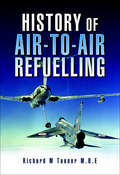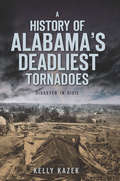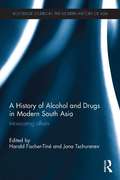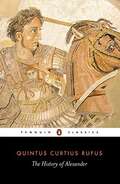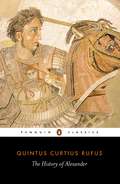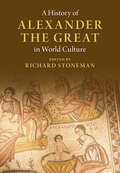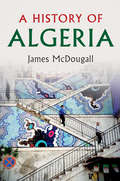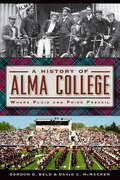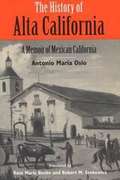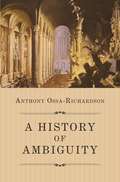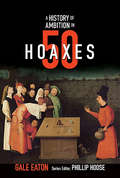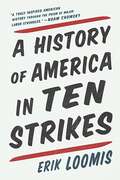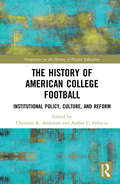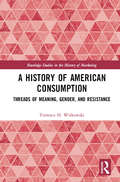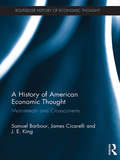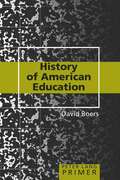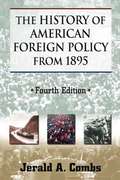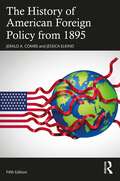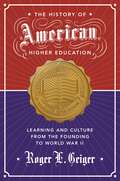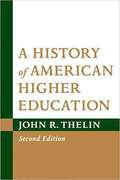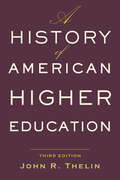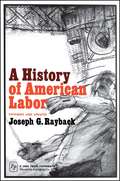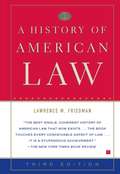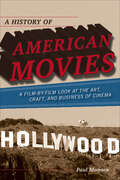- Table View
- List View
History of Air-to-Air Refuelling
by Richard M. TannerThis is a unique account of the development and operational use of air-to-air flight refuelling since its early beginnings in the USA and the UK to the equipment that is in use today. The author draws upon his life-long career as senior design engineer with the successful British company In-Flight Refuelling who were responsible for the development of the hose and drogue technique now preferred by many of the world's air forces. The story begins in the early 1920s when the art of air refuelling was part of the Barn Storming record-breaking attempts that were popular in the USA. It continues into the late thirties when successful experiments were made. Amazingly, the Royal Air Force were not interested in pursuing this great technical advantage during World War II and it was the USAAF who requested the British invention to experiment with on their B–17s and B-24s. The Korean War saw extended use of operational air-to-air refuelling for the first time and now the 'tanker fleet' is an essential unit in major air-forces around the world.
A History of Alabama's Deadliest Tornadoes: Disaster in Dixie
by Kelly KazekJourney just west of America's infamous Tornado Alley to Alabama, home to some of the deadliest tornadoes of the past century. These twisters remain etched in the collective memory of the people, from the 1908 Dixie Tornado, regarded as one of the most brutal tornadoes in U.S. history, to the 1998 Birmingham Tornado, the most expensive twister in Alabama's history. Discover how the 1932 Deep South Tornadoes resulted in 268 fatalities and millions of dollars in damage, and read the terrifying account of the 1977 Smithfield Tornadoes, which rocked this Birmingham suburb with as many as six twisters in a one-hour span. Join local journalist Kelly Kazek as she shares the tales of these natural disasters and the hardy Alabamians who endured them.
A History of Alcohol and Drugs in Modern South Asia: Intoxicating Affairs (Routledge Studies in the Modern History of Asia)
by Harald Fischer-Tiné Jana TschurenevAt the beginning of the 21st century, alcoholism, transnational drug trafficking and drug addiction constitute major problems in various South Asian countries. The production, circulation and consumption of intoxicating substances created (and responded to) social upheavals in the region and had widespread economic, political and cultural repercussions on an international level. This book looks at the cultural, social, and economic history of intoxicants in South Asia, and analyses the role that alcohol and drugs have played in the region. The book explores the linkages between changing meanings of intoxicating substances, the making of and contestations over colonial and national regimes of regulation, economics, and practices and experiences of consumption. It shows the development of current meanings of intoxicants in South Asia – in terms of politics, cultural norms and identity formation – and the way in which the history of drugs and alcohol is enmeshed in the history of modern empires and nation states — even in a country in which a staunch teetotaller and active anti-drug crusader like Mohandas Gandhi is presented as the ‘father of the nation’. Primarily a historical analysis, the book also includes perspectives from Modern Indology and Cultural Anthropology and situates developments in South Asia in wider imperial and global contexts. It is of interest to scholars working on the social and cultural history of alcohol and drugs, South Asian Studies and Global History.
The History of Alexander
by Quintus Curtius RufusAlexander the Great (356-323 BC), who led the Macedonian army to victory in Egypt, Syria, Persia and India, was perhaps the most successful conqueror the world has ever seen. Yet although no other individual has attracted so much speculation across the centuries, Alexander himself remains an enigma. Curtius' History offers a great deal of information unobtainable from other sources of the time. A compelling narrative of a turbulent era, the work recounts events on a heroic scale, detailing court intrigue, stirring speeches and brutal battles - among them, those of Macedonia's great war with Persia, which was to culminate in Alexander's final triumph over King Darius and the defeat of an ancient and mighty empire. It also provides by far the most plausible and haunting portrait of Alexander we possess: a brilliantly realized image of a man ruined by constant good fortune in his youth.
The History of Alexander
by Quintus Curtius RufusAlexander the Great (356-323 BC), who led the Macedonian army to victory in Egypt, Syria, Persia and India, was perhaps the most successful conqueror the world has ever seen. Yet although no other individual has attracted so much speculation across the centuries, Alexander himself remains an enigma. Curtius' History offers a great deal of information unobtainable from other sources of the time. A compelling narrative of a turbulent era, the work recounts events on a heroic scale, detailing court intrigue, stirring speeches and brutal battles - among them, those of Macedonia's great war with Persia, which was to culminate in Alexander's final triumph over King Darius and the defeat of an ancient and mighty empire. It also provides by far the most plausible and haunting portrait of Alexander we possess: a brilliantly realized image of a man ruined by constant good fortune in his youth.
A History of Algeria
by James McdougallCovering a period of five hundred years, from the arrival of the Ottomans to the aftermath of the Arab uprisings, James McDougall presents an expansive new account of the modern history of Africa's largest country. Drawing on substantial new scholarship and over a decade of research, McDougall places Algerian society at the centre of the story, tracing the continuities and the resilience of Algeria's people and their cultures through the dramatic changes and crises that have marked the country. Whether examining the emergence of the Ottoman viceroyalty in the early modern Mediterranean, the 130 years of French colonial rule and the revolutionary war of independence, the Third World nation-building of the 1960s and 1970s, or the terrible violence of the 1990s, this book will appeal to a wide variety of readers in African and Middle Eastern history and politics, as well as those concerned with the wider affairs of the Mediterranean.
A History of Alma College: Where Plaid and Pride Prevail (American Chronicles)
by Gordon G. Beld David C. McMackenCome along with authors Gordon Beld and David McMacken on a trip down memory lane to Alma College, a mid-Michigan school with a fascinating past, rich heritage and impressive influence. Look on as thousands of spectators flock to the campus for the annual Highland festival. Sit in the front row while a yet unknown young performer introduces you to a new song, "Take Me Home, Country Roads." Peek into a voting booth to see the ballot listing two former Alma students who are candidates for the U.S. vice presidency--in the same election. Learn how Alma students reached out to make a difference here at home and around the world..
The History of Alta California
by Antonio María OsioAntonio María Osio’s La Historia de Alta California was the first written history of upper California during the era of Mexican rule, and this is its first complete English translation. A Mexican-Californian, government official, and the landowner of Angel Island and Point Reyes, Osio writes colorfully of life in old Monterey, Los Angeles, and San Francisco, and gives a first-hand account of the political intrigues of the 1830s that led to the appointment of Juan Bautista Alvarado as governor. Osio wrote his History in 1851, conveying with immediacy and detail the years of the U.S.-Mexican War of 1846–1848 and the social upheaval that followed. As he witnesses California’s territorial transition from Mexico to the United States, he recalls with pride the achievements of Mexican California in earlier decades and writes critically of the onset of U.S. influence and imperialism. Unable to endure life as foreigners in their home of twenty-seven years, Osio and his family left Alta California for Mexico in 1852. Osio’s account predates by a quarter century the better-known reminiscences of Mariano Guadalupe Vallejo and Juan Bautista Alvarado and the memoirs of Californios dictated to Hubert Howe Bancroft’s staff in the 1870s. Editors Rose Marie Beebe and Robert M. Senkewicz have provided an accurate, complete translation of Osio’s original manuscript, and their helpful introduction and notes offer further details of Osio’s life and of society in Alta California.
A History of Ambiguity
by Anthony Ossa-RichardsonEver since it was first published in 1930, William Empson’s Seven Types of Ambiguity has been perceived as a milestone in literary criticism—far from being an impediment to communication, ambiguity now seemed an index of poetic richness and expressive power. Little, however, has been written on the broader trajectory of Western thought about ambiguity before Empson; as a result, the nature of his innovation has been poorly understood.A History of Ambiguity remedies this omission. Starting with classical grammar and rhetoric, and moving on to moral theology, law, biblical exegesis, German philosophy, and literary criticism, Anthony Ossa-Richardson explores the many ways in which readers and theorists posited, denied, conceptualised, and argued over the existence of multiple meanings in texts between antiquity and the twentieth century. This process took on a variety of interconnected forms, from the Renaissance delight in the ‘elegance’ of ambiguities in Horace, through the extraordinary Catholic claim that Scripture could contain multiple literal—and not just allegorical—senses, to the theory of dramatic irony developed in the nineteenth century, a theory intertwined with discoveries of the double meanings in Greek tragedy. Such narratives are not merely of antiquarian interest: rather, they provide an insight into the foundations of modern criticism, revealing deep resonances between acts of interpretation in disparate eras and contexts. A History of Ambiguity lays bare the long tradition of efforts to liberate language, and even a poet’s intention, from the strictures of a single meaning.
A History of Ambition in 50 Hoaxes (History in #50)
by Phillip Hoose Gale EatonWhat do the Trojan Horse, Piltdown Man, Keely Motor Company, and Ponzi Scheme have in common? They were all famous hoaxes, carefully designed and bolstered with false evidence. The con artists in this book pursued a variety of ambitions--making money, winning wars, mocking authority, finding fame, trading an ordinary life for a glamorous one--but they all chose the lowest, fastest road to get there. Every hoax is a curtain, and behind it is a deceiver operating levers and smoke machines to make us see what is not there and miss what is. As P.T. Barnum knew, you can short-circuit critical thinking in any century by telling people what they want to hear. Most scams operate on a personal scale, but some have shaped the balance of world power, inspired explorers to sail uncharted seas, derailed scientific progress, or caused terrible massacres. A HISTORY OF AMBITION IN 50 HOAXES guides us through a rogue's gallery of hustlers, liars, swindlers, imposters, scammers, pretenders, and cheats. In Gale Eaton's wide-ranging synthesis, the history of deception is a colorful tour, with surprising insights behind every curtain.
A History of America in Ten Strikes (G - Reference,information And Interdisciplinary Subjects Ser.)
by Erik LoomisRecommended by The Nation, the New Republic, Current Affairs, Bustle, In These Times An "entertaining, tough-minded, and strenuously argued" The Nation account of ten moments when workers fought to change the balance of power in America "A brilliantly recounted American history through the prism of major labor struggles, with critically important lessons for those who seek a better future for working people and the world." -Noam Chomsky Powerful and accessible, A History of America in Ten Strikes challenges all of our contemporary assumptions around labor, unions, and American workers. In this brilliant book, labor historian Erik Loomis recounts ten critical workers' strikes in American labor history that everyone needs to know about and then provides an annotated list of the 150 most important moments in American labor history in the appendix . From the Lowell Mill Girls strike in the 1830s to Justice for Janitors in 1990, these labor uprisings do not just reflect the times in which they occurred, but speak directly to the present moment. For example, we often think that Lincoln ended slavery by proclaiming the slaves emancipated, but Loomis shows that they freed themselves during the Civil War by simply withdrawing their labor. He shows how the hopes and aspirations of a generation were made into demands at a GM plant in Lordstown in 1972. And he takes us to the forests of the Pacific Northwest in the early nineteenth century where the radical organizers known as the Wobblies made their biggest inroads against the power of bosses. But there were also moments when the movement was crushed by corporations and the government; Loomis helps us understand the present perilous condition of American workers and draws lessons from both the victories and defeats of the past. In crystalline narratives, labor historian Erik Loomis lifts the curtain on workers' struggles, giving us a fresh perspective on American history from the boots up. Strikes include: -Lowell Mill Girls Strike Massachusetts, 1830-40 - Slaves on Strike The Confederacy, 1861-65 -The Eight-Hour Day Strikes Chicago, 1886 -The Anthracite Strike Pennsylvania, 1902 -The Bread and Roses Strike Massachusetts, 1912 - The Flint Sit-Down Strike Michigan, 1937 -The Oakland General Strike California, 1946 -Lordstown Ohio, 1972 -Air Traffic Controllers 1981 -Justice for Janitors Los Angeles, 1990
The History of American College Football: Institutional Policy, Culture, and Reform (Perspectives on the History of Higher Education)
by Christian K. Anderson Amber C. FalluccaThis volume provides unique insight into how American colleges and universities have been significantly impacted and shaped by college football, and considers how U.S. sports culture more generally has intersected with broader institutional and educational issues. By documenting events from the nineteenth and twentieth centuries including protests, legal battles, and policy reforms which were centred around college sports, this distinctive volume illustrates how football has catalyzed broader controversies and progress relating to race and diversity, commercialization, corruption, and reform in higher education. Relying foremost on primary archival material, chapters illustrate the continued cultural, social, and economic themes and impacts of college athletics on U.S. higher education and campus life today. This text will benefit researchers, graduate students, and academics in the fields of higher education, as well as the history of education and sport more broadly. Those interested in the sociology of education and the politics of sport will also enjoy this volume.
A History of American Consumption: Threads of Meaning, Gender, and Resistance (Routledge Studies in the History of Marketing)
by Terrence H. WitkowskiThe United States has been near the forefront of global consumption trends since the 1700s, and for the past century and more, Americans have been the world’s foremost consuming people. Informed and inspired by the literature from consumer culture theory, as well as drawing from numerous studies in social and cultural history, A History of American Consumption tells the story of the American consumer experience from the colonial era to the present, in three cultural threads. These threads recount the assignment of meaning to possessions and consumption, the gendered ideology and allocation of consumption roles, and resistance through anti-consumption thought and action. Brief but scholarly, this book provides a thought provoking, introduction to the topic of American consumption history informed by research in consumer culture theory. By examining and explaining the core phenomenon of product consumption and its meaning in the changing lives of Americans over time, it provides a valuable contribution to the literature on the subjects of consumption and its causes and consequences. Readable and insightful, it will be of interest to scholars and advanced students in consumer behaviour, advertising, and marketing and business history.
A History of American Economic Thought: Mainstream and Crosscurrents (The Routledge History of Economic Thought)
by Samuel Barbour James Cicarelli J. E. KingThis vital addition to the Routledge History of Economic Thought series surveys arguably the most important country in the development of economics as we know it today – the United States of America. A History of American Economic Thought is a comprehensive study of American economics as it has evolved over time, with several singularly unique features including: a thorough examination of the economics of American aboriginals prior to 1492; a detailed discussion of American economics as it has developed during the last fifty years; and a generous dose of non-mainstream American economics under the rubrics "Other Voices" and "Crosscurrents." It is far from being a native American community, and numerous social reformers and those with alternative points of view are given as much weight as the established figures who dominate the mainstream of the profession. Generous doses of American economic history are presented where appropriate to give context to the story of American economics as it proceeds through the ages, from seventeenth-century pre-independence into the twentieth-first century packed full of influential figures including John Bates Clark, Thorstein Veblen, Irving Fisher, Paul Samuelson, and John Kenneth Galbraith, to name but a few. This volume has something for everyone interested in the history of economic thought, the nexus of American economic thought and American economic history, the fusion of American economics and philosophy, and the history of science.
History of American Education Primer
by David BoersDepicting the evolution of American educational history from 1630 to the present, the book highlights how ideological managers have shaped society.
A History of American English (Longman Linguistics Library)
by J. L. DillardThis impressive volume provides a chronological, narrative account of the development of American English from its earliest origins to the present day.
The History of American Foreign Policy from 1895 (xx xx)
by Jerald A CombsThis important text offers a clear, concise and affordable narrative and analytical history of American foreign policy since the Spanish-American War. The book narrates events and policies but goes further to emphasize the international setting and constraints within which American policy-makers had to operate, the domestic pressures on those policy-makers, and the ideologies, preferences, and personal idiosyncrasies of the leaders themselves.
The History of American Foreign Policy from 1895 (xx xx)
by Jerald A. Combs Jessica ElkindNow in its fifth edition, this volume offers a clear, concise, and nuanced history of U.S. foreign relations since the Spanish–American War and places that narrative within the context of the most influential historiographical trends and debates.The History of American Foreign Policy from 1895 includes both revised and new sections that incorporate insights from recent scholarship on the United States in the world. These sections devote more attention to the international framework as well as the domestic constraints under which American foreign policymakers operated. This edition also emphasizes the role of non-state actors such as missionaries, aid workers, activists, and business leaders in shaping policies and contributing to international relations. As a result, the text considers a broader and more diverse range of people and voices than many other histories of U.S. foreign policy. Expanded final chapters bring the story of U.S. foreign relations to the present and explore some of the contemporary challenges facing American and global leaders, including terrorism, the effects of climate change, China’s increasing influence, and globalization. Updated controversial issues sections and suggestions for further reading at the end of each chapter reflect important contributions from new studies.This engaging text is an invaluable resource for students interested in the history of American foreign policy and international relations.
The History of American Higher Education: Learning and Culture from the Founding to World War II (The William G. Bowen Series #99)
by Roger L. GeigerAn authoritative one-volume history of the origins and development of American higher educationThis book tells the compelling saga of American higher education from the founding of Harvard College in 1636 to the outbreak of World War II. The most in-depth and authoritative history of the subject available, The History of American Higher Education traces how colleges and universities were shaped by the shifting influences of culture, the emergence of new career opportunities, and the unrelenting advancement of knowledge.Roger Geiger, arguably today's leading historian of American higher education, vividly describes how colonial colleges developed a unified yet diverse educational tradition capable of weathering the social upheaval of the Revolution as well as the evangelical fervor of the Second Great Awakening. He shows how the character of college education in different regions diverged significantly in the years leading up to the Civil War—for example, the state universities of the antebellum South were dominated by the sons of planters and their culture—and how higher education was later revolutionized by the land-grant movement, the growth of academic professionalism, and the transformation of campus life by students. By the beginning of the Second World War, the standard American university had taken shape, setting the stage for the postwar education boom.Breathtaking in scope and rich in narrative detail, The History of American Higher Education is the most comprehensive single-volume history of the origins and development of of higher education in the United States.
A History Of American Higher Education
by John R. ThelinColleges and universities are among the most cherished―and controversial―institutions in the United States. In this updated edition of A History of American Higher Education, John R. Thelin offers welcome perspective on the triumphs and crises of this highly influential sector in American life. Thelin’s work has distinguished itself as the most wide-ranging and engaging account of the origins and evolution of America's institutions of higher learning. This edition brings the discussion of perennial hot-button issues such as big-time sports programs up to date and addresses such current areas of contention as the changing role of governing boards and the financial challenges posed by the economic downturn.
A History of American Higher Education
by John R. ThelinThe definitive history of American higher education—now up to date.Colleges and universities are among the most cherished—and controversial—institutions in the United States. In this updated edition of A History of American Higher Education, John R. Thelin offers welcome perspective on the triumphs and crises of this highly influential sector in American life.Exploring American higher education from its founding in the seventeenth century to its struggle to innovate and adapt in the first decades of the twenty-first century, Thelin demonstrates that the experience of going to college has been central to American life for generations of students and their families. Drawing from archival research, along with the pioneering scholarship of leading historians, Thelin raises profound questions about what colleges are—and what they should be. Covering issues of social class, race, gender, and ethnicity in each era and chapter, this new edition showcases a fresh concluding chapter that focuses on both the opportunities and problems American higher education has faced since 2010. The essay on sources has been revised to incorporate books and articles published over the past decade. The book also updates the discussion of perennial hot-button issues such as big-time sports programs, online learning, the debt crisis, the adjunct crisis, and the return of the culture wars and addresses current areas of contention, including the changing role of governing boards and the financial challenges posed by the economic downturn. Anyone studying the history of this institution in America must read Thelin's classic text, which has distinguished itself as the most wide-ranging and engaging account of the origins and evolution of America's institutions of higher learning.
History of American Labor
by Joseph G. RaybackA compact and comprehensive chronicle of where labor has been and where it is today.
A History of American Law: Third Edition
by Lawrence M. FriedmanIn this brilliant and immensely readable book, Lawrence M. Friedman tells the whole fascinating story of American law from its beginnings in the colonies to the present day. By showing how close the life of the law is to the economic and political life of the country, he makes a complex subject understandable and engrossing. A History of American Law presents the achievements and failures of the American legal system in the context of America's commercial and working world, family practices, and attitudes toward property, government, crime, and justice. Now completely revised and updated, this groundbreaking work incorporates new material regarding slavery, criminal justice, and twentieth-century law. For laymen and students alike, this remains the only comprehensive authoritative history of American law.
A History of American Movies: A Film-by-Film Look at the Art, Craft, and Business of Cinema
by Paul MonacoIn A History of American Movies: A Film-by-Film Look at the Art, Craft and Business of Cinema, Paul Monaco provides a survey of the narrative feature film from the 1920s to the present. The book focuses on 170 of the most highly regarded and recognized feature films selected by the Hollywood establishment: each Oscar winner for Best Picture, as well as those voted the greatest by members of the American Film Institute. By focusing on a select group of films that represent the epitome of these collaborations, Monaco provides an essential history of one of the modern world's most complex and successful cultural institutions: Hollywood. Divided into three sections, "Classic Hollywood, 1927-1948," "Hollywood In Transition, 1949-1974," and "The New Hollywood, 1975 To The Present," Monaco examines some of the most memorable works in cinematic history, including The General, Wings, Bringing Up Baby, Gone with the Wind, Citizen Kane, Casablanca, On the Waterfront, The Searchers, Psycho, West Side Story, The Godfat
